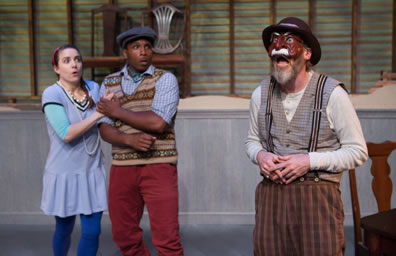The Miser
Commedia Dell'Arte Is an Easy Fit for Molière
By Molière, translated by George Mulford
Faction of Fools Theatre Company Gallaudet Eastman Studio, Washington, D.C.
Sunday, June 12, 2016, Second row, center of studio theater
Adapted and Directed by Toby Mulford

La Flèche (Kathryn Zoerb, front) conspires with Harpagon's son, Cléante (Clayton Pelham), to come up with money of his own so that he can break away from his father's tyranical reign in Faction of Fool's commedia dell'arte presentation of Molière's The Miser. Photo by Teresa Wood Photography, Faction of Fools.
Standard practice at Faction of Fools performances is to have a open-caption board above the stage. The board not only is a useful tool for Deaf members of the audience or patrons with hearing loss, it's essential for us hearing folk on those occasions when the cast includes Deaf students from Gallaudet University's theater program and the actors use only American Sign Language for their dialogue. Furthermore, the open-caption board often becomes incorporated into the action of the play; it even became a character in Faction of Fools' The Lady Becomes Him.
However, in a most unusual precedent, the open-caption board stopped working in Faction of Fools' current production, Molière's The Miser. I don't mean it went on the fritz; rather, the board took a scripted pause, bearing the message “(Here Harpagon improvises with the audience)” (parenthesis in the original).
Part of the fun of commedia dell'arte is how its masked, archetype performances include huge doses of in-the-moment spontaneity, and Toby Mulford's unscripted moment as Harpagon is one of this production's highlights. That it inserts a noticeable bolt of energy into the proceedings, however, indicates how, despite a talented cast and a classic script tailor-made for commedia dell'arte, this production never fully gets into a typical Faction of Fools groove.
Granted, that's a pretty groovy groove relative to that of most other theater companies. The critically acclaimed, award-winning Faction of Fools has managed to establish a commedia dell'arte foothold in the nation's capitol and advance its form of theatrical art by breaking that form's traditional boundaries. In the nine years since its founding, Faction of Fools has supplemented its purely commedia dell'arte scripts with a trio of William Shakespeare plays (Romeo and Juliet, Hamlet, and Titus Andronicus), the annual hit A Commedia Christmas Carol,and last year's powerful production of Thornton Wilder's Our Town, which topped Shakespeareances.com's list of favorites for 2015. So, upon hearing that the company was staging The Miser this summer, we got out our calendars.
Molière, the 17th century French playwright, was intimately familiar with commedia dell'arte, which developed on the streets of Italy in the early 1500s and spread across Europe by the end of that century. Molière's troupe shared its Paris theater with the Comédie-Italienne, and he was friends with its leader and star, Tiberio Fiorillo, one of the 17th century's most influential commedia practioners. Molière also used commedia stock characters in his plays, which is most noticeable in The Miser. Indeed, the play behaves as if Molière simply took an established commedia dell'arte treatment and gussied it up for his more aristocratic audience.
The title character, Harpagon, is a classic Pantalone, an old man greedy for both money and social status who selfishly stands in the way of his own children's pursuit of wealth, standing, and, especially, love. Those children are his daughter Élise, in love with Harpagon's steward Valère (representing the unmasked Innamorati or lovers of commedia dell'arte) who once saved her from drowning; and his son Cléante, in love with the poor girl Mariane. Harpagon wants to marry Élise to a mysterious gentleman named Anselme and plans to marry Mariane himself. Conspiring to circumvent Harpagon, Valère sucks up to his employer hoping to beguile him into granting his suit for Élise, a strategy that backfires. Cléante, on the other hand, enlists the assistance of his clever servant, La Flèche (the Zanni of this production), who sets out to obtain money for his master by hook or crook. Harpagon's cook and coachman, Maître Jacques, is in the tradition of the Scaramuccia (the commedia character Molière's friend Fiorillo made famous, by the way). Meanwhile, the matchmaker Frosine (La Signora) is negotiating Harpagon's marriage with the resistant Mariane. When Harpagon's hidden cash box is stolen, a Detective enters the fray with all the bluster of an incompetent braggart (e.g., Il Capitano). It all leads to a ridiculously contrived ending when a succession of secret identities and long-lost relations are revealed.
Faction of Fools' 90-minute, no-intermission production cuts out several minor characters (Mulford adapted a translation of the play by his father, George Mulford, who has a doctorate in French literature and is president of and frequent director at the Players Club of Swarthmore theater in Pennsylvania). More importantly, Mulford also pares down his cast to just five players, including himself in the title role and as Anselme. This not only means every actor doubling or, for Rachel Spicknall Mulford, tripling parts (she plays Élise, Frosine, and the Detective), but doing so while their characters are on stage simultaneously.
Switching roles right in front of us is part of the commedia shtick, especially for Clayton Pelham who plays both Cléante and Maître Jacques, the latter sometimes getting confused over whom he's supposed to be at any given time: “I'm not from this country,” he says by way of explaining his confusion when he forgets to switch from coachman to chef. This metatheatre device attains an admirable level of cleverness, especially when Spicknall Mulford removes her Detective's coat, helmet, and mask and sets them up on a hat stand so that the character remains in the scene even as the actress assumes the parts of Élise and Frosine. Except for the lovers (Élise and Valère, Cléante and Mariane), all of the characters are wearing masks, so changing from one to another is merely a matter of switching faces, posture, gait, and a piece of clothing (Costume Designer Lynly Saunders dresses the characters metaphorically with a vaguely 1930s sense of fashion). By the end of the climactic last scene, the unused masks are laying about on Daniel Flint's simple city apartment set.

Harpagon (Toby Mulford), the titular miser in play, explains his plans to his children, Élise (Rachel Spicknall Mulford) and Cléante (Clayton Pelham) in the Faction of Fool's production of Molière's The Miser. Representing the Innamorati of the commedia dell'arte tradition, the children don't wear masks. Photo by Teresa Wood Photography, Faction of Fools.
The cast is competent in all this commedia shenanigans, including Jane Enabore, a Gallaudet student playing the plaintive Mariane and the shady loan shark Simon. And competent is high praise as we're not looking for much in the way of subtlety here but rather heightened gestures and expression along with often acrobatic physical comedy. Given that, two performers stand out: Pelham, bringing balletic jazz limberness to his Cléante and stock clumsiness to his Maître Jacque; and Kathryn Zoerb, doubling as Valère and La Flèche (did Mulford assign roles according to which way the accent slants over the e in their names?). Zoerb displays astonishing skill, first, unmasked, posturing as the stoically brave young male lover to Spicknall Mulford's sweetly doting Élise. Then, she leaves the stage and returns seconds later, in that time donning a mask and changing her vest for overalls, moving in a shuffling hunch and using a completely different voice as La Flèche. Though she's wearing the Zanni mask as the servant, it's her bearing and diction that make her unrecognizable as the same actress playing both parts.
Which points to a problem I had with this production: the masks. Designed by Newman, they are dark and brooding, hardly distinguishable from our seats even in the small performance space and lacking the mystically expressive personalities we've seen in previous Faction of Fools productions (and other commedia dell'arte plays). And like the masks, the play has a fallow soul. Great commedia dell'arte is not only supposed to be slapstick fun—which this production is—but also emotionally engaging at the least and, if really good, psychologically audacious. The Miser doesn't attain that level of connection. Given what this company has done with Shakespeare, Dickens, and Wilder, I lay responsibility at the feet of Molière—or perhaps The Miser is too easy a fit for commedia conventions to have sufficiently challenged Mulford and his cast, except for their having to tackle multiple roles (then again, Faction of Fools' Commedia Romeo and Juliet had a cast of five, as well—small troupes playing multiple roles is part of the commedia tradition).
To be sure, this was a technically well-acted commedia dell'arte performance and an enjoyable time at the theater. But, frankly, the most exciting moment for me came when I turned to the back cover of the program and saw Faction of Fools' “Coming Soon!” advertisement. “If you tickle us, do we not laugh?” That's Shylock's line from The Merchant of Venice, which Faction of Fools plans to bring to the stage this fall. Having seen the company workshop that controversial Shakespeare play, I predict it will be as audacious as the tickle line in the marketing suggests.
Get out your calendars.
Eric Minton
June 23, 2016
Comment: e-mail editorial@shakespeareances.com
Start a discussion in the Bardroom



 Find additional Shakespeareances
Find additional Shakespeareances